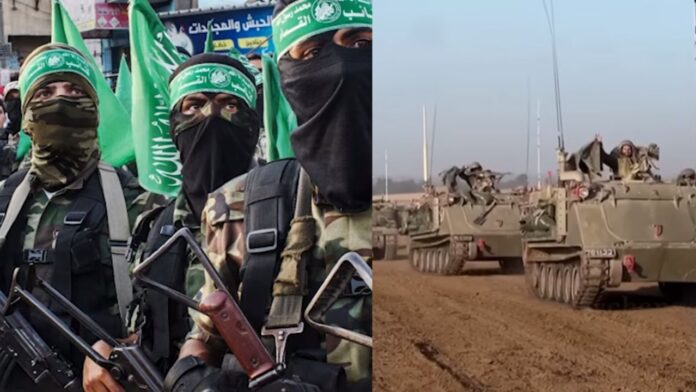Intense discussions were taking place as the ceasefire in the Israel-Gaza conflict approached its last day.
Statements from various parties, including Israel, Hamas, and the United States, were released overnight and in the morning, emphasizing the importance of extending the four-day pause in the ongoing Israel and Gaza conflict, which is set to conclude on Monday.
The diplomatic efforts are ongoing as both parties make preparations for a fourth exchange of prisoners. Israel has stated that it is willing to temporarily halt its military operations in the enclave for one day, on the condition that 10 more captives are released. However, Israel has also restated its determination to persist in the fight until achieving what it considers a “victory”.
US President Joe Biden expressed his hope for the continuation of the temporary truce between Israel and Hamas, emphasizing the importance of the release of captives. Yesterday, the Palestinian group released an additional 17 individuals, one of whom was a four-year-old girl with Israeli-American citizenship.
Continuing the ceasefire “My goal, and our collective goal, is to extend this pause beyond tomorrow. This will allow us to facilitate the release of more hostages and provide increased humanitarian relief to those in need in Gaza,” stated Biden during a news conference.
The anticipated itinerary for US Secretary of State Antony Blinken includes a visit to Israel on Monday, followed by his attendance at a NATO foreign ministers’ meeting in Brussels. It is likely that the ongoing crisis in Gaza will be a topic of discussion during the sidelines of the meeting.
On Sunday, Israeli Prime Minister Benjamin Netanyahu revealed that he had a conversation with Biden regarding the release of captives. However, he mentioned that he also informed the US leader that, once the truce concludes, Israel would resume its efforts with determination to achieve its objectives of eliminating Hamas and securing the release of all captives.
On Sunday, Netanyahu made history as the first Israeli leader since 2005 to visit Gaza. Perched atop a tank in military attire, he restated the objectives of the war to the soldiers, while also acknowledging the potential for prolonging the ceasefire.
Hamas expressed its willingness to prolong the cessation of hostilities if there are genuine endeavors to secure the release of more Palestinian prisoners held by Israel.
A spokesperson expressed the group’s desire for a temporary cessation of fighting, contingent upon the release of prisoners.
According to the Palestinian Authority, there are ongoing efforts by Qatar, Egypt, the US, the EU, and Spain to extend the deal.
The current truce could potentially be extended for a few more days, although the exact duration remains uncertain, according to Foreign Minister Riyad al-Maliki.
There have been four rounds of exchanges
Israel released an additional 39 teenage Palestinian prisoners on Sunday, bringing the total number of releases to 117 since the truce began.
Hamas announced that it has completed the fourth phase of the truce deal exchanges by releasing 13 Israelis, three Thais, and one individual with Russian citizenship. The Palestinian group has released a total of 58 captives, with 39 being released to Israel.
The International Committee of the Red Cross has confirmed the successful transfer of the latest group from Gaza on Sunday.
Biden expressed his belief that all parties involved in the region are actively seeking a resolution to ensure the safe release of the hostages and to remove Hamas from power in Gaza.
In addition, he shared his joy regarding the liberation of Abigail Edan, a four-year-old captive who is both American and Israeli.
Last week, a four-day truce was agreed upon, marking the first break in the ongoing fighting that has persisted for seven weeks since Hamas’s attack on October 7. According to Israel, this attack resulted in the death of 1,200 people and the capture of approximately 240 hostages who were taken back into Gaza.
Israel has launched a military operation in response to the attack, conducting airstrikes and deploying ground forces in the enclave. According to Gaza health authorities, a significant number of Palestinians have lost their lives, with many others forced to leave their homes.
‘Extension is unlikely’
Even though there have been diplomatic attempts, some people in the area aren’t sure if the truce can be extended.
Ibrahim Abusharif from Northwestern University in Qatar said it’s not likely to happen based on what Israel is says.
According to him, a ceasefire is not the same as putting out the fire at the source of the conflict between Israelis and Palestinians. He told Al Jazeera this.
“If they’re just keeping the peace for a few more days and then starting to fight again, it doesn’t seem like a good way to move forward.” It’s not going anywhere.”
According to Israeli Army Radio on Monday, the government in Tel Aviv was waiting to hear back from Hamas about extending the ceasefire for one more day in exchange for the freedom of 10 prisoners.
Egypt’s Ministry of Foreign Affairs said that Blinken talked with his Egyptian colleague Sameh Shoukry on Sunday about the problems that are making Israel’s peace deal with Hamas less likely to last and how to end the fighting for good.
Meanwhile, Beijing’s Foreign Ministry said that Wang Yi, China’s top diplomat, will go to New York this week to hold a UN Security Council meeting about the war between Israel and Hamas.
Josep Borrell, who is in charge of foreign affairs for the EU, also joined the call to keep the peace.
At the start of a meeting of the Union for the Mediterranean on Monday, he said, “The pause should be extended to make it sustainable and long-lasting while working for a political solution.” Israel was not present at the meeting.
“Political solution that should allow us to break the cycle of violence once and for all,” the European voiced their desire.
“Nothing can justify the brutality Hamas used against civilians without discrimination” on October 7, he said. “But one horror doesn’t make another horror okay.”
Jens Stoltenberg, Secretary-General of NATO, said that extending the ceasefire “would give the people of Gaza much-needed relief and free more hostages.”
While talking to reporters in Brussels, he also said that Iran should control its “proxies.” By “proxies,” he most likely meant the Hezbollah group in Lebanon.




![Ranking US States: From Healthiest to Least Healthy [2024 Guide] Health Rankings US States](https://articleify.com/wp-content/uploads/2024/03/Health-Rankings-US-States-218x150.jpg)









![Technical Aspects of 844 Area Code in 2024 [Detail Guide] 844 Area Code](https://articleify.com/wp-content/uploads/2024/01/844-Area-Code-150x150.jpg)














